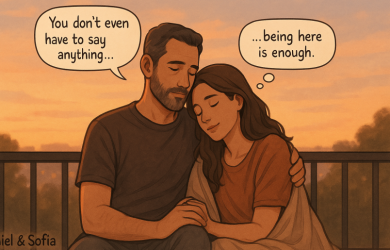10 Ways Storytelling in a Relationship Can Help Couples

Heal & Grow Daily for a Happier Relationship
Subscribe FREEKey Takeaways
Marriage.com AI Quick Summary
In a relationship, couples can seek unique ways to deepen their connection and understand each other better. One timeless method that stands out for its simplicity and depth is storytelling. Sharing stories between partners is not just an act of communication; it’s a bridge to empathy, understanding, and intimacy.
The storytelling approach goes beyond mere conversation, inviting both individuals into the world of the other, encouraging a shared experience that is both enriching and enlightening.
10 ways storytelling in a relationship can help nurture your bond
Storytelling in a relationship is a powerful tool that can significantly nurture and strengthen the bond between partners. It’s not just about recounting events but about sharing emotions, experiences, and dreams.
Here is how effective relationship storytelling can enhance the connection in significant ways, with each point illustrating its importance and offering insights into making storytelling an integral part of your relationship.
1. Cultivating empathy through shared experiences
Storytelling in a relationship offers a unique lens through which we view our partner’s world, encouraging empathy. By sharing personal stories, we invite our partners into our inner emotional landscapes, allowing them to feel what we felt.
Research indicates that negative empathy in partners is likely to affect relationships by heightening individuals
Sharing of experiences isn’t just about the narrative itself but the emotions and lessons intertwined within. Through compelling relationship storytelling, we create a shared emotional space that can deepen our empathy and understanding for each other.
2. Bridging gaps in understanding
Every story shared is a piece of the puzzle that makes up who we are. Storytelling in a relationship acts as a bridge, connecting our past and present, our dreams, and our fears. These narratives help clarify misunderstandings and illuminate the reasons behind our actions and reactions.
Relationship storytelling techniques that focus on clarity, emotion, and authenticity can significantly reduce confusion, making way for a stronger connection and better communication.
3. Strengthening trust and vulnerability
Opening up to share personal and often private stories is a testament to the trust between partners. Storytelling in a relationship requires vulnerability—a willingness to expose parts of ourselves that we might normally keep guarded.
Research demonstrates that trust is crucial in forming enduring and satisfying romantic partnerships between individuals. However, the cultivation of trust is presumed to rely on various factors associated with prior experiences and beliefs regarding relationships of an individual.
Opening up can demonstrate trust in our partner’s empathy and understanding and deepens that trust, creating a cycle of openness and intimacy that is crucial for a strong relationship.
4. Enriching the relationship narrative with diversity
Each story shared adds color and depth to the narrative of the relationship. These stories bring in diversity—of experiences, thoughts, and emotions—enriching the tapestry of the relationship.
Storytelling in a relationship isn’t just about recounting past events; it’s about weaving a rich, shared narrative that encompasses the breadth of both partners’ lives, creating a more vibrant and inclusive relationship story.
5. Enhancing communication skills
The act of storytelling is, at its core, an exercise in communication. Storytelling in a relationship helps refine how we express our thoughts, feelings, and experiences. It teaches us to be more engaging, clear, and passionate in our communication.
According to Christiana Njoku, LPC
Storytelling is a skill that couples must have to help them share their stories and better capture their experiences.
By practicing storytelling, we can learn to convey complex emotions and thoughts in a way that is accessible and meaningful to our partner, enhancing the overall communication in the relationship.
6. Promoting mutual growth and learning
Stories are not just recounts; they are lessons wrapped in narratives. Through storytelling in a relationship, partners share the wisdom gained from their experiences, promoting mutual growth and learning.
These stories can inspire, motivate, and challenge us, pushing us to grow individually and as a couple. This shared learning journey and growing together can further strengthen the bond between partners.
7. Building a foundation for resilience
The stories of challenges faced, obstacles overcome, and resilience shown are particularly powerful. Storytelling in relationships often includes sharing tales of adversity, which highlight our strengths and the support we’ve given or received.
Sharing not only promotes a deeper appreciation for each other’s resilience but also strengthens the relationship by highlighting its role as a source of support and strength during tough times.
8. Creating a legacy of love
Storytelling in a relationship is an act of creating and sharing the legacy of your love. These stories, especially relationship storytelling examples that highlight key moments and milestones in the relationship, become a part of your shared history.
They are stories that can be revisited, shared with future generations, and celebrated as markers of your journey together.
Watch this TED Talk where Psychologist and researcher Joanne Davila shares skills for a healthy romantic relationship:
9. Enhancing intimacy through creative sharing
The creative aspect of storytelling—imagining together, dreaming up future adventures, and even creating fictional tales—adds a layer of intimacy to the relationship.
Christiana Njoku highlights that:
Storytelling in relationships enhances intimacy, love, and bonding between partners. Engage storytelling skills today!
Creative sharing through storytelling in a relationship opens up new avenues for connection, allowing partners to explore and enjoy a shared imaginative space. It’s a way to connect not just through the reality of your past but through the boundless potential of your future.
10. Nurturing a sense of belonging and togetherness
Storytelling in a relationship nurtures a profound sense of belonging and togetherness. By sharing our stories, we are saying, “This is me, and I want you to be a part of my story.”
Such an invitation into each other’s lives enables a deep sense of belonging and togetherness, reinforcing the idea that, despite our individual journeys, we are creating a shared narrative, a shared life.
FAQs
Storytelling in a relationship can unlock new levels of understanding and intimacy. Here are answers to some frequently asked questions that can help you tackle the art of sharing stories within your partnership.
- How can I encourage my partner to open up and share their stories and experiences with me?
Create a safe, non-judgmental space for conversation. Express genuine interest in your partner’s life and experiences. Start by sharing your own stories and vulnerabilities, which can set a precedent of openness and trust. Ask open-ended questions that invite elaboration rather than simple yes or no answers.
- What should I do if my partner’s stories trigger uncomfortable emotions or memories for me?
Acknowledge and accept your feelings without judgment. Communicate your emotions to your partner calmly and clearly, expressing how certain stories affect you. Consider establishing boundaries around particularly sensitive topics and seek professional support to work through these triggers.
-
Can we use specific storytelling prompts or exercises to spark conversation and connection in our relationship?
Many prompts exist, such as “Describe a moment when you felt incredibly proud of yourself” or “Share a memory from your childhood that brings you joy.” You can also create a ritual of sharing daily highs and lows or try on storytelling games and activities that encourage deeper sharing.
-
How can we ensure that storytelling remains a positive and constructive activity in our relationship rather than leading to misunderstandings or conflicts?
Practice active listening and respond with empathy and support. Avoid interrupting or offering unsolicited advice. Clarify misunderstandings by asking questions. Emphasize the importance of respect and understanding in all storytelling activities, and agree to pause a conversation if it becomes too heated or uncomfortable.
-
What role do cultural or familial narratives play in shaping our storytelling practices and relationship dynamics?
Cultural and familial narratives significantly influence our values, beliefs, and communication. Understanding and respecting these narratives can enhance empathy and appreciation for each other’s backgrounds. Sharing stories about cultural and family traditions can enrich the relationship, providing a deeper context for understanding each other’s experiences and perspectives.
To summarize
Incorporating storytelling into a relationship offers many benefits that contribute to a stronger, deeper connection between partners. It is a journey of discovery, understanding, and intimacy that celebrates the uniqueness of each individual and the strength of their bond.
Couples can enrich their relationship in profound ways by valuing and practicing storytelling, creating a lasting foundation of love, empathy, and companionship.
Want a healthier, happier relationship - one step at a time?
 Tips
Tips
Write your tip or submit a video tip
All tips are reviewed before the publishing.
Share this article on
Recent Articles
Related Quizzes
Heal & Grow Daily for a Happier, Healthier Relationship
Subscribe FREE on YouTube We'd love your feedback!
We'd love your feedback!
 Expert Q&A
Expert Q&A
Ask your question related to this topic & get the support you deserve from experts.





















 Thanks for your feedback!
Thanks for your feedback!